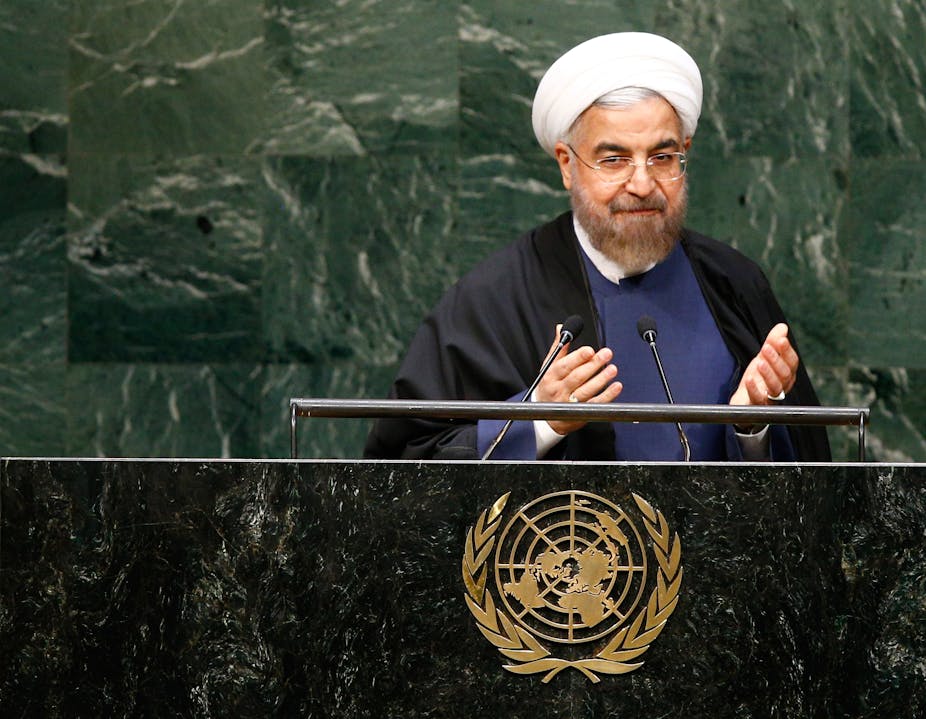With instability plaguing the Middle East since the emergence of Islamic State (IS), Iran is once again faced with spiralling instability and Western military interventions just across its border. It also finds itself running out of time in crucial nuclear weapons negotiations, with only weeks to go before the deadline to strike a deal.
For those looming reasons, Iranian president Hassan Rouhani’s speech to the United Nations General Assembly on September 25 was priority listening for world leaders rapidly getting embroiled in the conflict in Iraq and Syria.
In the end, what he chose to do was to project both an independent and moderate Iranian persona – and also to try and soothe the disquiet from elements within Iran who are increasingly furious at the US-led mission against IS.
In it together
A particularly significant theme, one that recurred throughout his address, was the importance of a regional solution to the IS crisis.
By pushing this narrative, Rouhani was playing a double game. On the one hand, by dwelling on the need for greater regional co-operation, he gently but earnestly reached out to Iran’s neighbours with whom relations have been strained in recent years.
But on the other, he indirectly castigated the West (and especially the US) for their culpability in allowing IS to form in the first place – with a rhetorical flourish about certain intelligence agencies putting “razorblades in the hands of mad men”.
The familiar anti-colonial barbs were also present, showing the ideological heritage of a moderate who still remains very much a man of the revolution.
He also appreciated that terrorism had become a globalised force and that global responses were therefore required, but the emphasis remained on regional action rather than imposition from outside.
Interestingly, Rouhani also emphasised the vital role of the Middle East’s “moderate leaders”.
He noted that such leaders had long felt the impact of colonialism and outside interests in the region and, importantly, that they knew their own responsibilities and sometimes failings. He presented these unnamed leaders as the true face of moderate Islam in the region; while not naming names, he was clearly holding himself and his administration up as vanguards of an anti–IS ideological and political bloc.
No nukes?
On the nuclear issue, Rouhani managed to show off the considerable leeway he has in Iran’s foreign affairs in comparison with his predecessor presidents – a sign of the unique trust Iran’s supreme leader, Ali Khamenei, apparently places in him (he was, after all, previously the secretary of Iran’s Supreme National Security Council and was in charge of Iran’s nuclear dossier during the previous negotiations from 2003-2005).
Amid the now-familiar bemoanings of supposed Western efforts to undermine the nuclear negotiations – see his veiled reference to the recent imposition of new sanctions against Iran by the US – he spoke optimistically of the “seriousness and optimism” all sides have brought to the negotiations.
And pushing the argument further, Rouhani drew an explicit link between the ongoing nuclear talks and the need for Iran to play a more significant role in regional responses to terrorism.
He said he remained hopeful and was determined to continue with the process in the short time left until the next deadline in November. But, perhaps most tellingly, he noted that a final settlement in the talks could serve as the beginning of greater multilateral strategic co-operation in the region, paving the way for Iran to play a role in combating violence and extremism in co-ordination with its neighbours.
Silver linings
Despite the pessimism of some commentators, who argue that America’s renewed military activities in Iran’s backyard will stymie further rapprochement, there is ample cause for optimism both in the speech and in the face-to-face meetings that Rouhani held while in New York.
Throughout his address, Rouhani regularly called for constructive interaction – a clear attempt to position Iran as a full partner in the fight against IS. This, of course, has already begun to be realised in practice via logistical and material support for Iraqi forces, who have been pushing back against the group in recent weeks.
The next step is obvious: while the re-entry of the US into Iraq has hardly been welcomed in all quarters in Iran, with displeasure voiced by Khamenei himself, the hope is that the common enemy in IS will provide a new stage for Iranian interaction with the West.
And Rouhani’s New York appearance demonstrated that that process is already well underway. In a gesture that would have been unthinkable under his predecessor Mahmoud Ahmadinejad, Rouhani met with both British prime minister, David Cameron, and the French president, Francois Hollande, in the days prior to his General Assembly appearance, and positive noises were heard from both meetings.
Such diplomacy is a sign that Western-Iranian relations are continuing to thaw rather than freeze – and that this thaw might paradoxically be hastened, not slowed, by the renewed violence in the region.

